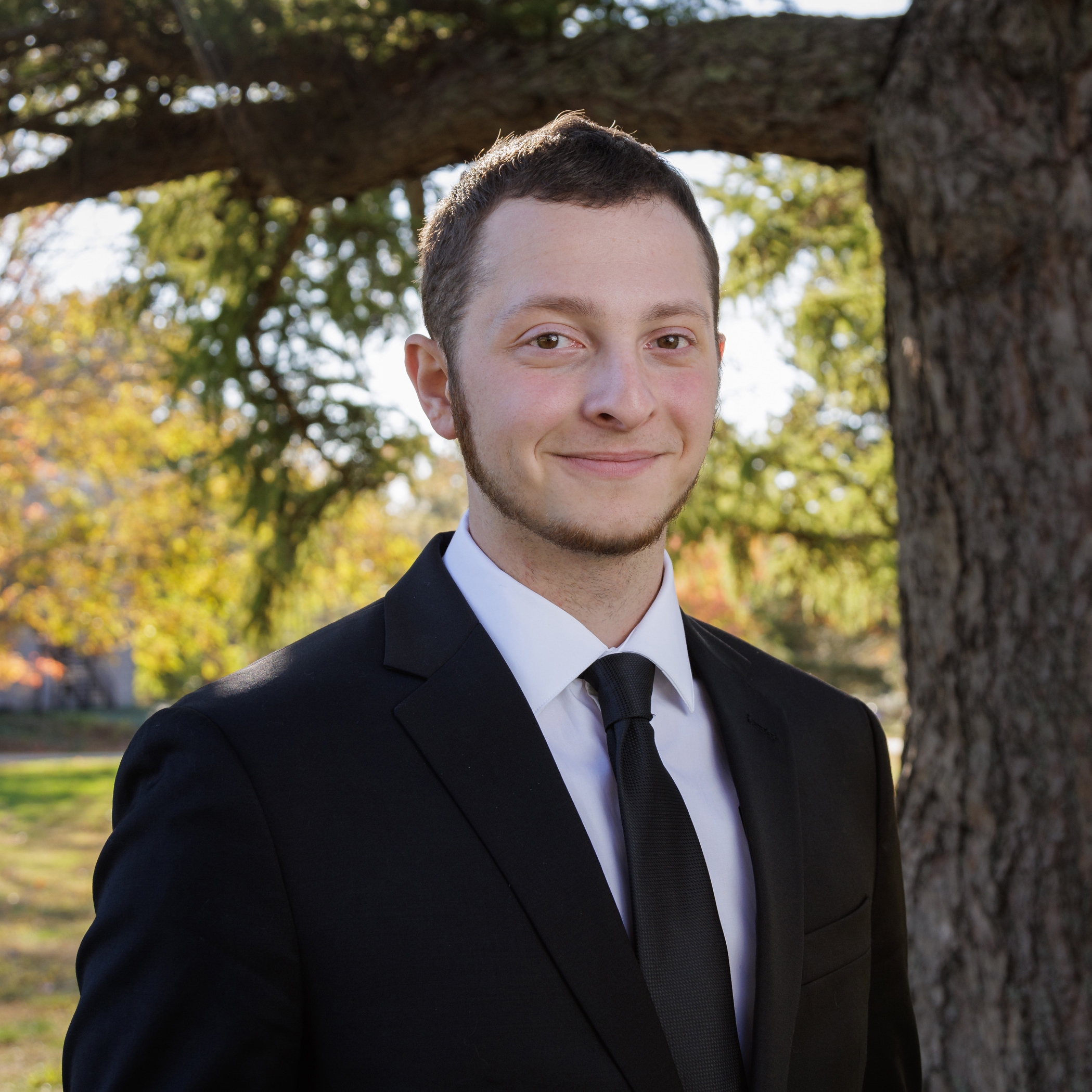
Austin Robertson
Peace and Conflict Pathway
Peace in the Presence of Hate
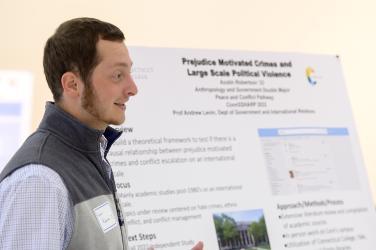 Austin, a government and anthropology double major, joined the Peace and Conflict Pathway to better understand how both can exist at the same time in particular societies. “This has been especially pertinent for me as a Jewish student who went to high school in a rural area of Vermont,” he says. “The school never understood the constant conflict I experienced at the hands of anti-Semitic kids, and administrators always claimed how peaceful Rutland was. In the pathway, I have used my past self as a personal ethnographic study.” In 2021, Austin conducted research with History Professor Catherine Stock about the intersection of Jewish identity and whiteness in American politics. This past summer, he assisted International Relations Professor Andrew Levin on a research project focused on prejudice-motivated crimes and conflict escalation. Those experiences, along with his major study and Spanish language, Jewish studies and statistics coursework, helped him formulate the animating question of his Symposium presentation: Can peace truly exist in a society experiencing hate crimes? Austin plans to pursue a career in criminal litigation and credits his Connections experience for his newfound self-confidence. “I chose to write my law school personal statement about the pride I have in my Jewish identity after years of struggling to accept myself. My experiences in this Pathway played a large role in my ability to learn about my own identity and academic interests.”
Austin, a government and anthropology double major, joined the Peace and Conflict Pathway to better understand how both can exist at the same time in particular societies. “This has been especially pertinent for me as a Jewish student who went to high school in a rural area of Vermont,” he says. “The school never understood the constant conflict I experienced at the hands of anti-Semitic kids, and administrators always claimed how peaceful Rutland was. In the pathway, I have used my past self as a personal ethnographic study.” In 2021, Austin conducted research with History Professor Catherine Stock about the intersection of Jewish identity and whiteness in American politics. This past summer, he assisted International Relations Professor Andrew Levin on a research project focused on prejudice-motivated crimes and conflict escalation. Those experiences, along with his major study and Spanish language, Jewish studies and statistics coursework, helped him formulate the animating question of his Symposium presentation: Can peace truly exist in a society experiencing hate crimes? Austin plans to pursue a career in criminal litigation and credits his Connections experience for his newfound self-confidence. “I chose to write my law school personal statement about the pride I have in my Jewish identity after years of struggling to accept myself. My experiences in this Pathway played a large role in my ability to learn about my own identity and academic interests.”
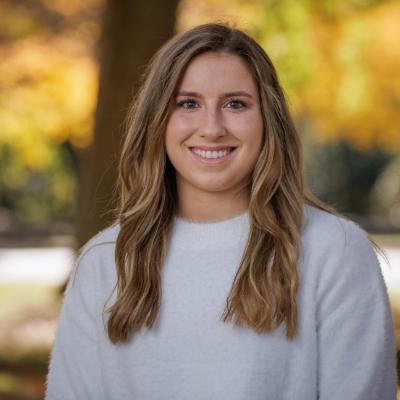
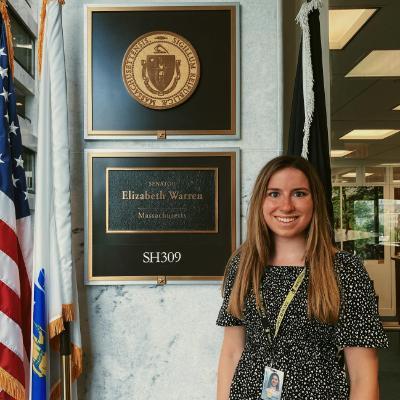 Erica, an international relations major and Arabic minor, has always been interested in pursuing a career in journalism or government, which made the Media Pathway especially appealing. “Everything has a communications element—politics, public health, marketing, even everyday life,” she says. In her Pathway courses, Erica learned what makes a persuasive communicator, studied media coverage of controversial issues such as climate change and guns, and analyzed speeches. As a sophomore, she completed a writing and editing internship with the Department of Veterans Affairs, and as a rising junior she received a grant from Conn’s Sharis ’86 & Thorn ’88 Pozen Endowed Fund for Excellence in Journalism, Writing and Media to serve as a communications intern at the nonprofit think tank The Foundation for Defense of Democracies. This past summer, she interned with U.S. Senator Elizabeth Warren, an experience that inspired her Symposium presentation, “The Power of One,” in which she explores what makes Warren an influential figure and how she uses her influence within the Democratic Party. After graduation, Erica, who is also captain of Conn’s track and field team and holds multiple school records in triple jump, hopes to work in Washington, D.C., ideally in the Senate.
Erica, an international relations major and Arabic minor, has always been interested in pursuing a career in journalism or government, which made the Media Pathway especially appealing. “Everything has a communications element—politics, public health, marketing, even everyday life,” she says. In her Pathway courses, Erica learned what makes a persuasive communicator, studied media coverage of controversial issues such as climate change and guns, and analyzed speeches. As a sophomore, she completed a writing and editing internship with the Department of Veterans Affairs, and as a rising junior she received a grant from Conn’s Sharis ’86 & Thorn ’88 Pozen Endowed Fund for Excellence in Journalism, Writing and Media to serve as a communications intern at the nonprofit think tank The Foundation for Defense of Democracies. This past summer, she interned with U.S. Senator Elizabeth Warren, an experience that inspired her Symposium presentation, “The Power of One,” in which she explores what makes Warren an influential figure and how she uses her influence within the Democratic Party. After graduation, Erica, who is also captain of Conn’s track and field team and holds multiple school records in triple jump, hopes to work in Washington, D.C., ideally in the Senate. 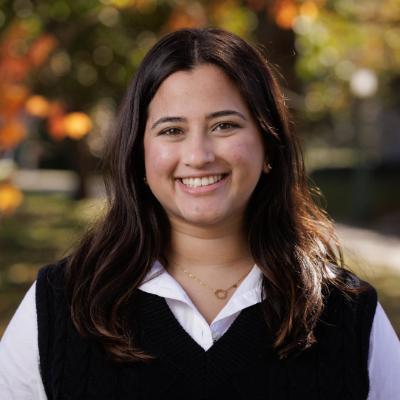
 An environmental studies major and chemistry minor, Meera became interested in studying racial disparities in cardiovascular disease care after reading an article about racial bias in clinical care for one of her classes. She joined the Public Health Pathway and interned with the cardiology division at Beth Israel Deaconess Medical Center in Boston, Mass., where she conducted research on the mutations of genes important to blood clotting and heart disease. She also shadowed doctors on cardiology inpatient consults and at outpatient clinics. “Conducting laboratory research while also interacting with patients in need of cardiovascular care taught me about the important connections between research and clinical practices,” she says. Meera, who plans to pursue an M.D. and master’s in public health, presented a poster at the Symposium detailing the influence of race on heart disease and what can be done to improve patient care. “I hope my audience learned that racial disparities in cardiovascular disease exist and are well established in the healthcare world, and that there are concrete ways to address these issues that should be implemented at the clinical level to best support marginalized communities.”
An environmental studies major and chemistry minor, Meera became interested in studying racial disparities in cardiovascular disease care after reading an article about racial bias in clinical care for one of her classes. She joined the Public Health Pathway and interned with the cardiology division at Beth Israel Deaconess Medical Center in Boston, Mass., where she conducted research on the mutations of genes important to blood clotting and heart disease. She also shadowed doctors on cardiology inpatient consults and at outpatient clinics. “Conducting laboratory research while also interacting with patients in need of cardiovascular care taught me about the important connections between research and clinical practices,” she says. Meera, who plans to pursue an M.D. and master’s in public health, presented a poster at the Symposium detailing the influence of race on heart disease and what can be done to improve patient care. “I hope my audience learned that racial disparities in cardiovascular disease exist and are well established in the healthcare world, and that there are concrete ways to address these issues that should be implemented at the clinical level to best support marginalized communities.” 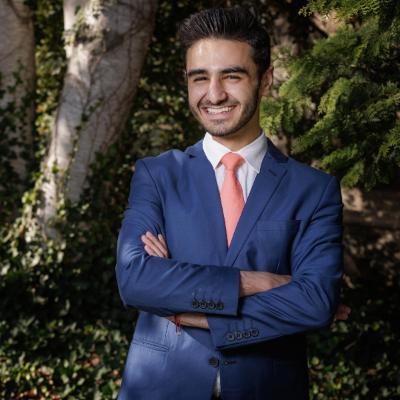
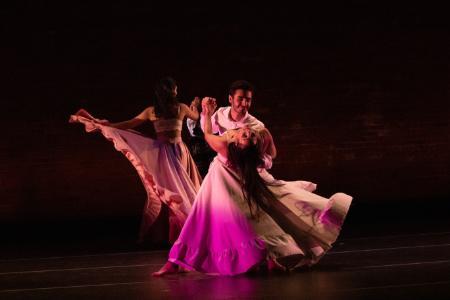 A dance major and computer science minor, Moqu says the Ammerman Center has been a perfect fit for his dual interests in arts and technology. “I’ve learned how to look at ideas through lenses of technology and expression, and apply those visions through creativity, problem-solving and love of learning.” As part of a Conn-funded summer fellowship, Moqu spent eight weeks working with the critically acclaimed David Dorfman Dance company to create an interface platform to connect past, present and future DDD workshop participants and facilitators. He studied abroad in Athens during his junior year and then spent the summer working as a sound, lighting and production assistant at The School at Jacob’s Pillow, a prestigious conservatory in Becket, Mass. “I’ve had so many lovely opportunities to work with amazing artists and choreographers from around the world,” he says. At the Symposium, he presented “The Infinite Cracked Hourglass: A Dance Retrospection.” After graduation, he plans to pursue a multifaceted career in dance focused on performance, teaching, sound design, lighting and production management. “Dancing warms my heart, ignites my passion and drives me to be a better version of myself,” he says.
A dance major and computer science minor, Moqu says the Ammerman Center has been a perfect fit for his dual interests in arts and technology. “I’ve learned how to look at ideas through lenses of technology and expression, and apply those visions through creativity, problem-solving and love of learning.” As part of a Conn-funded summer fellowship, Moqu spent eight weeks working with the critically acclaimed David Dorfman Dance company to create an interface platform to connect past, present and future DDD workshop participants and facilitators. He studied abroad in Athens during his junior year and then spent the summer working as a sound, lighting and production assistant at The School at Jacob’s Pillow, a prestigious conservatory in Becket, Mass. “I’ve had so many lovely opportunities to work with amazing artists and choreographers from around the world,” he says. At the Symposium, he presented “The Infinite Cracked Hourglass: A Dance Retrospection.” After graduation, he plans to pursue a multifaceted career in dance focused on performance, teaching, sound design, lighting and production management. “Dancing warms my heart, ignites my passion and drives me to be a better version of myself,” he says. 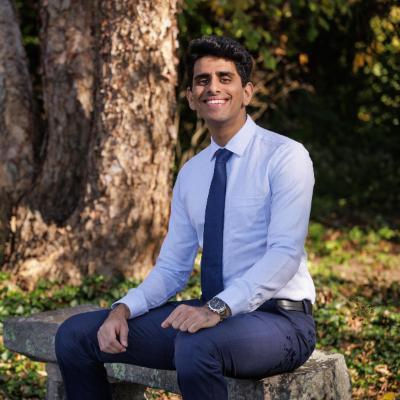
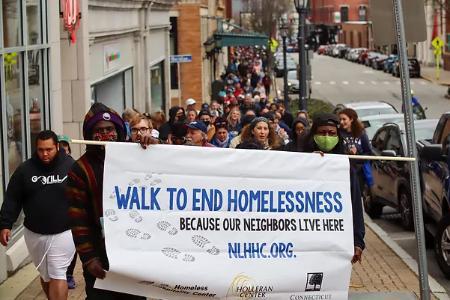 Sukrit, a mathematics major with a concentration in statistics, is interested in researching and addressing issues of mental health and homelessness both in Conn’s hometown of New London and in his home country of India. “I’m passionate about community service and engagement, and I want to change the world for the better," he says. “The Holleran Center gave me the platform and the resources I needed to pursue my passion on a larger scale and to have a more significant impact on the community.” Sukrit volunteers at the New London Homeless Hospital Center, where he works to address the needs of clients and studies the impact of mental health within the community. He also conducts outreach to people experiencing homelessness and suffering from PTSD. At the Symposium, he discussed his senior integrative project: How does mental health stigmatization prevent the traumatized homeless population from making a recovery and finding a stable household? “Mental health problems are often seen as a sign of weakness and failure, and this has prevented many people from getting the therapy and medication they need,” he says. After graduation, Sukrit plans to pursue a career in consulting or technology, while continuing to address social issues in his communities.
Sukrit, a mathematics major with a concentration in statistics, is interested in researching and addressing issues of mental health and homelessness both in Conn’s hometown of New London and in his home country of India. “I’m passionate about community service and engagement, and I want to change the world for the better," he says. “The Holleran Center gave me the platform and the resources I needed to pursue my passion on a larger scale and to have a more significant impact on the community.” Sukrit volunteers at the New London Homeless Hospital Center, where he works to address the needs of clients and studies the impact of mental health within the community. He also conducts outreach to people experiencing homelessness and suffering from PTSD. At the Symposium, he discussed his senior integrative project: How does mental health stigmatization prevent the traumatized homeless population from making a recovery and finding a stable household? “Mental health problems are often seen as a sign of weakness and failure, and this has prevented many people from getting the therapy and medication they need,” he says. After graduation, Sukrit plans to pursue a career in consulting or technology, while continuing to address social issues in his communities. 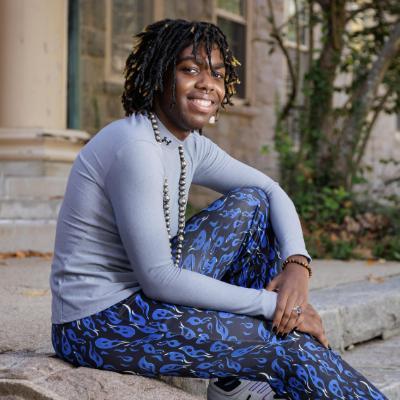
 An environmental studies major and computer science minor, Coretta says the pathway experience was transformative. “I have realized my capacity for success on my own terms and from that have found much more peace in my explorations through the world and plans for my future.” Coretta’s Symposium presentation, “Knowing A Market: A Study Into Consumer Co-Creation,” aims to create a business framework personalized enough to make customers feel invested in a location’s community, but repeatable enough to lend itself to franchisability. “My inspiration came from a small second shop in Portland, Maine,” Coretta says. “The shop distinguished itself by presenting clothes curated with the owner's distinct style, and I became fixated on deconstructing how a chain or brand could ever match up to that personable feel.” After graduation, Coretta will move to South Africa to pursue a master’s degree and start a community resource shop franchise. “I chose to focus on sustainability-aware community building work because emotions and the connections I make with my customers have always been my main motivation.”
An environmental studies major and computer science minor, Coretta says the pathway experience was transformative. “I have realized my capacity for success on my own terms and from that have found much more peace in my explorations through the world and plans for my future.” Coretta’s Symposium presentation, “Knowing A Market: A Study Into Consumer Co-Creation,” aims to create a business framework personalized enough to make customers feel invested in a location’s community, but repeatable enough to lend itself to franchisability. “My inspiration came from a small second shop in Portland, Maine,” Coretta says. “The shop distinguished itself by presenting clothes curated with the owner's distinct style, and I became fixated on deconstructing how a chain or brand could ever match up to that personable feel.” After graduation, Coretta will move to South Africa to pursue a master’s degree and start a community resource shop franchise. “I chose to focus on sustainability-aware community building work because emotions and the connections I make with my customers have always been my main motivation.”